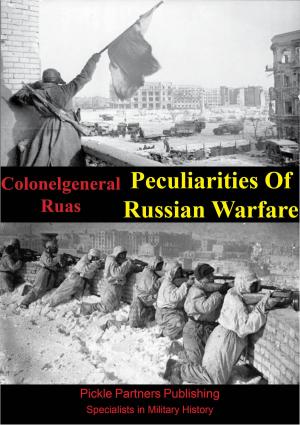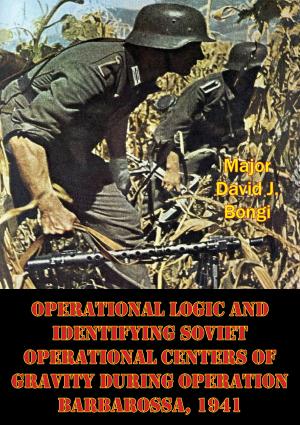The Soviet Partisan Movement, 1941-1944
Nonfiction, History, Germany, European General, Military, United States| Author: | Edgar M. Howell | ISBN: | 9781782896173 |
| Publisher: | Verdun Press | Publication: | August 15, 2014 |
| Imprint: | Verdun Press | Language: | English |
| Author: | Edgar M. Howell |
| ISBN: | 9781782896173 |
| Publisher: | Verdun Press |
| Publication: | August 15, 2014 |
| Imprint: | Verdun Press |
| Language: | English |
The purpose of this text is to provide the Army with a factual account of the organization and operations of the Soviet resistance movement behind the German forces on the Eastern Front during World War II. This movement offers a particularly valuable case study, for it can be viewed both in relation to the German occupation in the Soviet Union and to the offensive and defensive operations of the Wehrmacht and the Red Army.
The scope of the study includes an over-all picture of a quasi-military organization in relation to a larger conflict between two regular armies. It is not a study in partisan tactics, nor is it intended to be. German measures taken to combat the partisan movement are sketched in, but the story in large part remains that of an organization and how it operated. The German planning for the invasion of Russia is treated at some length because many of the circumstances which favored the rise and development of the movement had their bases in errors the Germans made in their initial planning. The operations of the Wehrmacht and the Red Army are likewise described in considerable detail as the backdrop against which the operations of the partisan units are projected.
Because of the lack of reliable Soviet sources, the story has been told much as the Germans recorded it. German documents written during the course of World War II constitute the principal sources, but many survivors who had experience in Russia have made important contributions based upon their personal experience.
The purpose of this text is to provide the Army with a factual account of the organization and operations of the Soviet resistance movement behind the German forces on the Eastern Front during World War II. This movement offers a particularly valuable case study, for it can be viewed both in relation to the German occupation in the Soviet Union and to the offensive and defensive operations of the Wehrmacht and the Red Army.
The scope of the study includes an over-all picture of a quasi-military organization in relation to a larger conflict between two regular armies. It is not a study in partisan tactics, nor is it intended to be. German measures taken to combat the partisan movement are sketched in, but the story in large part remains that of an organization and how it operated. The German planning for the invasion of Russia is treated at some length because many of the circumstances which favored the rise and development of the movement had their bases in errors the Germans made in their initial planning. The operations of the Wehrmacht and the Red Army are likewise described in considerable detail as the backdrop against which the operations of the partisan units are projected.
Because of the lack of reliable Soviet sources, the story has been told much as the Germans recorded it. German documents written during the course of World War II constitute the principal sources, but many survivors who had experience in Russia have made important contributions based upon their personal experience.



![Cover of the book August Storm: Soviet Tactical And Operational Combat In Manchuria, 1945 [Illustrated Edition] by Edgar M. Howell](https://www.kuoky.com/images/2015/november/300x300/9781786250414-ib3A_300x.jpg)

![Cover of the book Attack Transport; The Story Of The U.S.S. Doyen [Illustrated Edition] by Edgar M. Howell](https://www.kuoky.com/images/2015/november/300x300/9781786252630-aDmV_300x.jpg)
![Cover of the book Battle For The Solomons [Illustrated Edition] by Edgar M. Howell](https://www.kuoky.com/images/2015/november/300x300/9781786251848-l00S_300x.jpg)





![Cover of the book THE NEW ZEALANDERS IN SINAI AND PALESTINE [Illustrated Edition] by Edgar M. Howell](https://www.kuoky.com/images/2014/june/300x300/9781782892441-FJuE_300x.jpg)
![Cover of the book Conversations With A Stuka Pilot [Illustrated Edition] by Edgar M. Howell](https://www.kuoky.com/images/2014/august/300x300/9781782898450-BiYs_300x.jpg)
![Cover of the book Desert Warfare: German Experiences In World War II [Illustrated Edition] by Edgar M. Howell](https://www.kuoky.com/images/2014/august/300x300/9781782893776-MTwr_300x.jpg)
